A life full of ‘kangaroos’ for Pakistanis in Australia
Moving abroad may sound exciting but settling into a different place away from home is a challenge for many
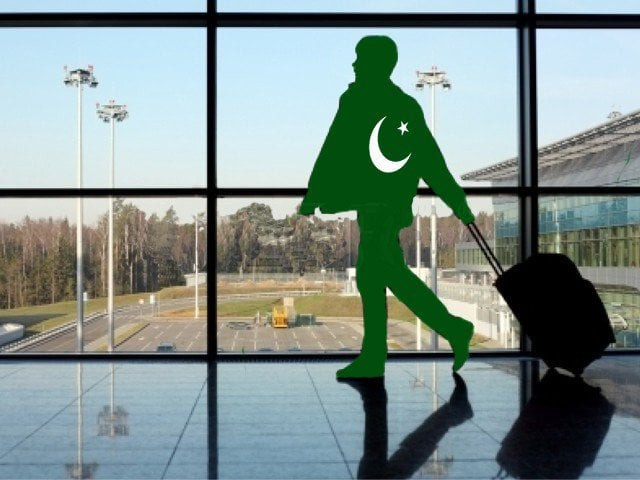
Moving abroad may sound exciting to the ears, but settling in away from home is a major challenge for many. PHOTO: FILE
For Pakistanis, Australia remains a preferred destination after the US and Canada to find a place where they can settle and hope for a future that they had always been aiming for. Many of them manage to start a living as they hoped for through hard work and luck. However, things are not always as good as they may seem, according to Faruqi, the first-ever Muslim woman and Australian national of Pakistani descent elected as a parliamentarian.
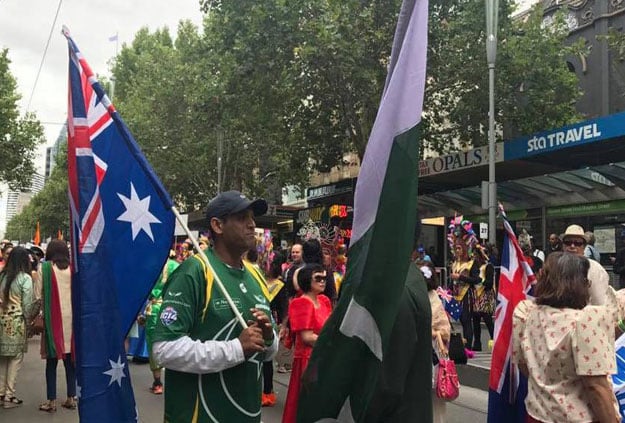 The Pakistani community in Australia. PHOTO: ONLINE
The Pakistani community in Australia. PHOTO: ONLINE“There are many issues that the Pakistani community faces in Australia along with other migrant communities that also included finding the right job. Resume racism is also a reality here.”
Ejaz Khan – a Pakistan-born Australian lawyer – however, is also not fully content with the Pakistani community’s role in Australia and identifies several issues confronting them.
“Pakistanis are afraid of assimilation with the Australians as they consider it as a threat to their faith and belief. They do not want their children to adopt the Australian cultural norms and traditions and therefore avoid interaction and social gatherings with the locals,” explains Khan.
10 most bizarre questions Pakistanis get asked abroad
“A number of the Pakistani families still believe that women’s movement [even in Australia] should be restricted to their homes and that they should not work and mingle with other communities,” Khan says adding that the language barrier and non-recognition of Pakistani migrants’ qualification and experience are also few of the issues being faced by the community in Australia.
However, Abbas Rana, President Pakistan Association of Australia, rejects these claims. “While observing their own cultural norms and religious beliefs, our people [Pakistanis] are playing a key role in Australia and there is no problem of integration or interaction at all,” he asserted.
Probably two sides of the same coin!
Domestic violence is common in Pakistani families
Violent behaviour towards women has been a huge concern in Pakistan and when Pakistani families, with their orthodox mindsets, settle in a foreign country, most of them struggle to follow the laws of the land. Consequently, domestic violence in a Pakistani household life in Australian structure becomes a major problem that the community confronts.
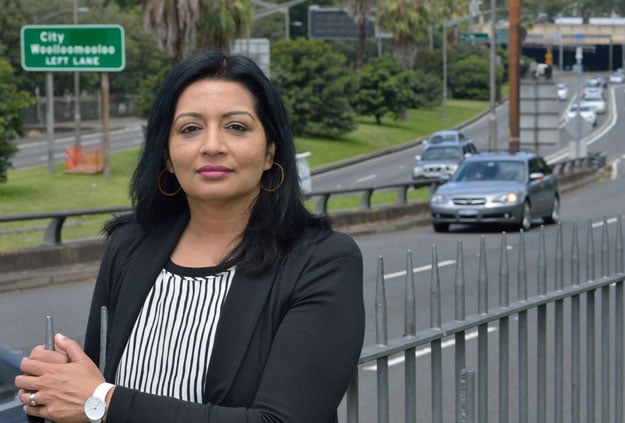 Mehreen Faruqi, a Pakistan-born politician in Australia. PHOTO COURTESY: www.mehreenfaruqi.org.au
Mehreen Faruqi, a Pakistan-born politician in Australia. PHOTO COURTESY: www.mehreenfaruqi.org.auEjaz Khan, who also runs an organisation by the name of Pakistan Australia Association aimed at resolving domestic violence issues, complains that despite living in Australia for years, Pakistani men still consider women as subservient to them and do not hesitate to use undue force against them.
“Pakistani parents try to find a life partner for their children in Pakistan because they think local partners are more submissive than the ones in Australia. This is why they keep silent in cases of domestic violence instead of approaching the authorities to get the assailants punished,” Khan says while highlighting the core matter.
Paying fees, other expenses becomes tough at times
According to Abdul Majid Yousfani, the Consul General of Pakistan, the number of Pakistani students in Australia is estimated to be around 16,500. Most of them are settled in Victoria.
2.43 million Pakistanis working in Europe
From being able to pay the surging university fees to find a good job in a competitive market, Pakistani students face serious issues every day. Exploitation by employers is a major concern.
“The university fee in Australia frequently goes up and a student now has to pay around 30,000 Australian Dollars a year in fee,” reveals Usama Siddiqui, a Pakistani student who recently graduated from the Australian Institute of Higher Education Sydney.
Even after completing studies, a student has to pay another 6,000-10,000 Australian Dollars for an internship in a firm for a year, he adds while complaining that the students are usually unable to pay the fee even when they do double jobs.
Finding a job that students really want to do is an enormous task and even if they find it luckily, most of the employers offer peanuts as compared to the legal wage in Australia. The plight does not end here. Employers even push them to work hard for long hours, which is also against the local work laws, says Siddiqui.
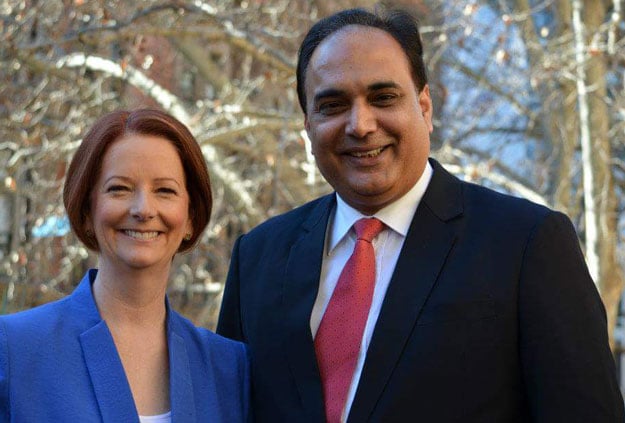 Ejaz Khan, a Pakistan-born lawyer in Australian, with former Australian PM Julia Gillard. PHOTO: ONLINE
Ejaz Khan, a Pakistan-born lawyer in Australian, with former Australian PM Julia Gillard. PHOTO: ONLINEThey say community belongs to terror-sponsoring state
Notwithstanding its efforts to root out terrorism from its soil and the entire region, in most of the western countries, Pakistan is believed to be a country that supports militancy and harbours militants. Australia is no exception.
Yousfani, however, maintains that the West's propaganda is purely negative and wrong. He criticises how they, in fact, always overlook the sacrifices of Pakistan in the war against terror.
“Owing to the geopolitical location of Pakistan, we are facing great challenges and attacks from everywhere. Our sacrifices and efforts to fight terrorism and restore peace in the region must be lauded. We cannot control western media but we can promote our soft image as a peace-loving country,” says Yousfani.
Pakistanis outside Pakistan: What August 14 means to them
For Faruqi, Pakistani community is Australia is respected well despite the undesirable propaganda.
“War and terrorism now impact us all and we have deep anxieties about this. Unfortunately, some political leaders in Australia have used this situation to engage in dog whistling and encouraging racist and bigoted views on migrants and refugees.”
Khan, on the other hand, links the negative portrayal of Pakistan with the religious side of the community due to which, he says, Pakistanis faces complications in Australia.
A home for many Pakistani refugees, asylum-seekers
Insecurity and uncertainty haunt the community members in both Pakistan and Australia. But, during the last couple of years, Australia has become a home for thousands of Pakistani refugees and asylum-seekers who found refuge here.
A big chunk of a list of the applicants who want to migrate to Australia is from the Hazara community of Balochistan.
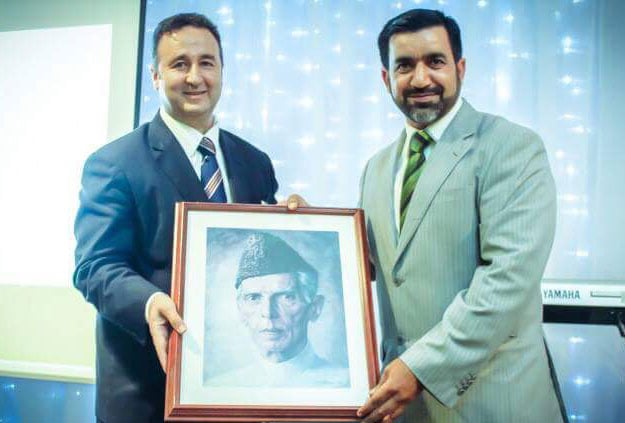 Abbas Rana (R), President Pakistan Association of Australia. PHOTO: FILE
Abbas Rana (R), President Pakistan Association of Australia. PHOTO: FILEJaffar Ali arrived in Australia on a boat in 2012 after receiving threats in Quetta by terrorists. He is a refugee in Australia now, on a three-year temporary protection visa that does not allow him to sponsor his family.
“I have been living in Australia for the past five years and my temporary protection visa is going to expire in 2019. I cannot go back to Pakistan due to security reasons. We have lost more than 3,000 people of our community over the past 17 years with not even a single perpetrator having been punished by the authorities till date,” he says.
“I am in a fix because I can neither go back to my home country nor can live a happy life in Australia alone without my family,” Ali says while sighing deeply at the thought.
Terrorism has wrecked Pakistan’s image in Australia
Many Australians think of Pakistan as a country where terrorism and extremism rule more than the law and the government’s writ. Persistent incidents of terrorism targeting innocent people have badly destroyed Pakistan’s image as a peaceful country.
“I have never been to Pakistan but the newspaper and news channels stories about Pakistan have made me think of it as a dangerous country where the killing of people is an order of the day,” says Sarah, a 26-year old fashion designer.
Entering an interracial or interfaith marriage — a labour of love
Natasha, another Australian girl who works as a sales manager in a company, speaks about Pakistan as a country with delicious spicy food, hot weather and top-class cricketers.
Time could be tough and realities could be changing, but the community must find its priorities in the mainland. Other locals are also confident that Pakistanis can certainly become a productive part of the larger Australian family.
Richard Curzon, an Australian author, considers Pakistani people as intelligent, friendly, generous and hospitable people with a good grasp of British English. For him, they are making an excellent contribution to the Australian society by working in widespread industries and professions such as medicine, engineering, technology, university education, law and financial management.
“Australians who do not think for themselves and use anti-Muslim politicians such as Paulin Hanson and Jacquie Lambie to think and speak for them are more likely to conclude that the Pakistanis, they do not know, might be extremists, are more likely to be involved in planning a violent act and are trying to introduce Shariah to Australia,” Curzon insists.
Amjad Hussain is a freelance journalist based in Australia.



















COMMENTS
Comments are moderated and generally will be posted if they are on-topic and not abusive.
For more information, please see our Comments FAQ